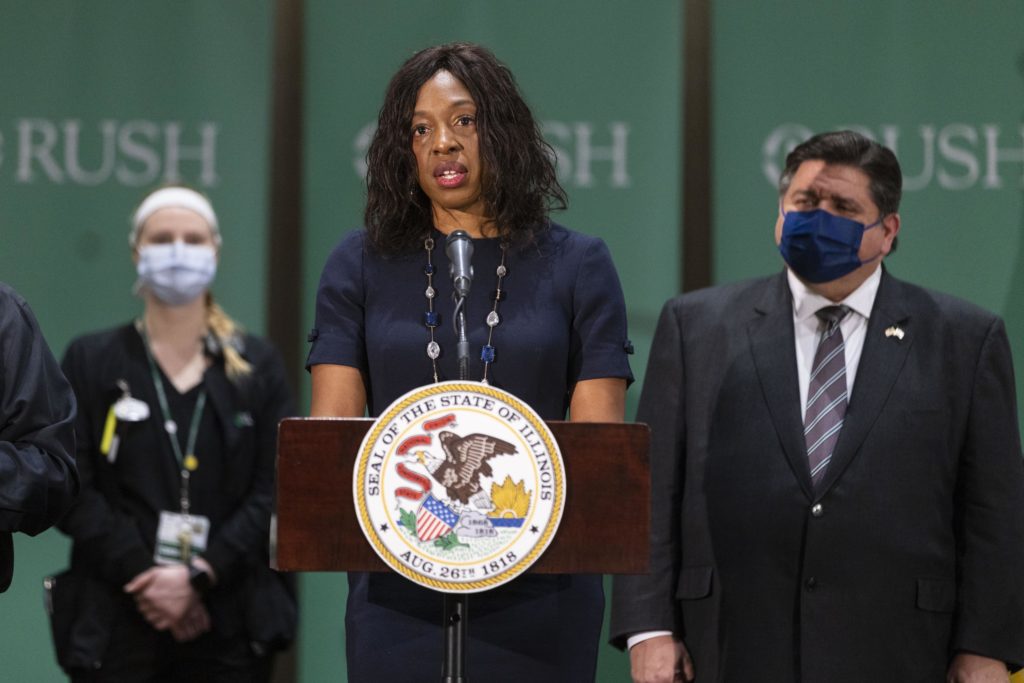
SPRINGFIELD, Ill. (AP) — Dr. Ngozi Ezike, thrust into an unsolicited spotlight as the face of Illinois’ battle against the COVID-19 pandemic, announced Tuesday she is leaving her post as state public health director.
The 49-year-old pediatrician has been an ever-present sidekick of Gov. J.B. Pritzker’s since the coronavirus made its Illinois debut in January 2020. Her last day will be March 14.
Ezike said during a Chicago news conference that she has no immediate professional plans but would take advantage of a lull in the pandemic to step aside and give more attention to her family.
Pritzker said she has attended 161 COVID-19 news conferences with him, “providing not only the latest expertise and data but also her empathy and compassion, becoming a beacon of stability for millions during this time of tremendous pain.”
The announcement came a day after the Democratic governor issued an executive order lifting the requirement that people wear face coverings in most public places. Hospitalizations and new COVID-19 infections have dropped significantly after a January peak during the onslaught of the virus’ omicron variant.
Succeeding Ezike as interim director of the Illinois Department of Public Health will be Amaal Tokars, 59, who joined the agency in June 2020 and serves as assistant director.
Ezike, who makes $179,915, recalled journal entries she made when the newly inaugurated Pritzker tabbed her in January 2019 — one expressed excitement at being “stretched to the limits — I didn’t exactly know the full impact of that.”
For the first year, she went up against the typical challenges facing a public health director — a rare and deadly fungus, the annual reappearance of mosquito-borne West Nile virus, a death from vaping thought to be the nation’s first and Legionnaire’s disease at retirement homes, a 2014 outbreak of which at a veterans’ home haunted her predecessor.
The first COVID-19 case in Illinois — and only the nation’s second — was reported in Chicago on Jan. 24, 2020.
“I did not know fully what I was getting into but I had ideals that I believed in that would be my guiding light,” Ezike said. “One is believing that everyone deserves the opportunity to achieve their best health. A second is (for) the best care for a diverse population. We are so blessed to have a team that reflects that diversity to create the most robust and inclusive solutions.”
While she endured some public protests, she largely escaped the ridicule and recrimination directed at Pritzker for his mitigation strategies to slow the spread of the the disease that has claimed more than 32,600 lives in Illinois. She was lauded for delivering her public remarks in Spanish as well as English.
Ezike imbued trust with her stoic and unflappable demeanor and conjured sympathy when she broke down in October 2020 after reporting another 31 deaths and imploring the public to stay vigilant.
“If you’re talking about COVID fatigue from having to keep wearing a mask, think about the COVID fatigue for health care workers … trying to fight for people’s lives,” Ezike said that day.
“She has an unshakable faith in God and she has leaned on her faith to give her the strength to care for the world,” Pritzker said. “I have watched Dr. Ezike mourn the loss of every one of the more than 32,000 who have died from COVID-19.”
By JOHN O’CONNOR for the Associated Press
